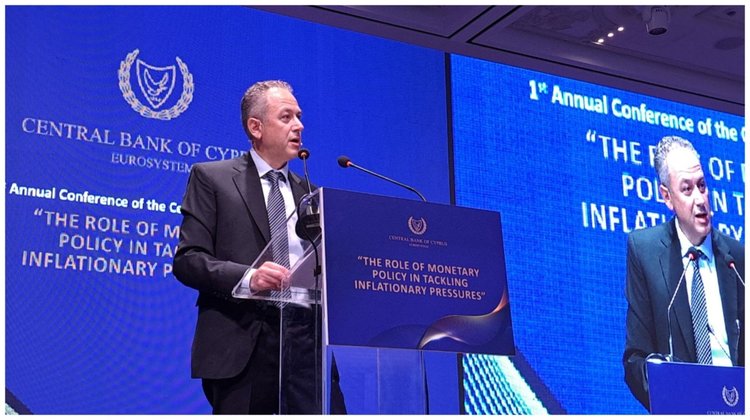Nicolaou: Resilience, credibility and good reputation crucial for Cyprus banking sector
17:17 - 04 October 2023

In a panel discussion at the 1st Annual Conference of the Central Bank of Cyprus, three experts gave their view on the theme ‘Cyprus economy, outlook and opportunities’.
The panel discussion included the participation of Irene Piki, Deputy Minister to the President of the Republic of Cyprus, Panicos Nicolaou, Chairman of the Board of Directors, Association of Cyprus Banks, and Evgenios Evgeniou, Chairman, Invest Cyprus.
Speaking during the panel discussion, Nicolaou noted that the banks of Cyprus had gone through a series of turbulent, most recently culminating in the pandemic and war in Ukraine.
He cautioned that when monetary policy was aggressively tight, the risk of errors was created and the risk of an unanticipated deeper recession could not be underestimated.
“In turbulence, our country has shown remarkable resilience and grounds for optimism but we will remain watchful,” he said.
More specifically on the banking system, Nicolaou said that resilience has improved steadily and that banks were in a very different position today than 10 years ago.
He said that changing policies and increased liquidity had created improvement and that the profitability of banks had aided the upgrade of their ratings.
He noted that Moody’s upgrading of two of Cyprus banks this week, for the first time in 12 years was good for the country as a whole as well as for the banks.
Nicolaou went on to note, “Higher inflation means higher interest rates, slower economic activity, lower growth, but long-held risk are moderated by relatively strong growth, employment and other factors improving the (banking) sector. This could be its best year.”
He noted improvements to the loans aspect of the banking sector including that the bank loan-to-resident ratio was the lowest it had ever been.
Deposits also amounted to double the amount of loans he said, giving 21 billion euros and approximately 42 billion euros as the relevant figures.
“It is also important to mention that we are operating in a liquid market, one of the most liquid markets in Europe as far as deposits are concerned,” Nicolaou underlined.
However, he also went on to caution that higher interest rates also meant higher risks.
“A mild recession is always part of a business cycle but do not want tight measures to lead to a more serious recession. So how high and how long the ECB intends is something we need to remain mindful of,” he noted.
He said that buffers in place were currently protecting the banking sector and that Cyprus was “in a good position to be in” while cautioning that the “margin of error for small countries is small.”
Earlier during the event, there was also a panel discussion on ‘Inflation uncertainty ramifications on investment and business decisions’ with the participation of João Sousa, Deputy Director General, DG Economics, European Central Bank, and Ernest Gnan, Secretary General, SUERF – The European Money and Finance Forum and Honorary Economic Advisor to the OeNB Governor.
The invitation-only event in Limassol also included a keynote speech by European Central Bank Vice President Luis de Guindos, following a welcoming address by Central Bank of Cyprus Governor Constantinos Herodotou.
A networking cocktail is due to close the event.

